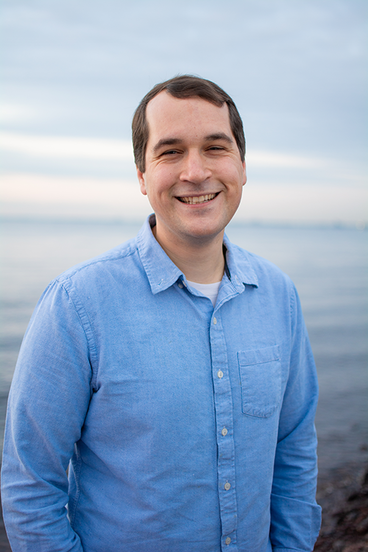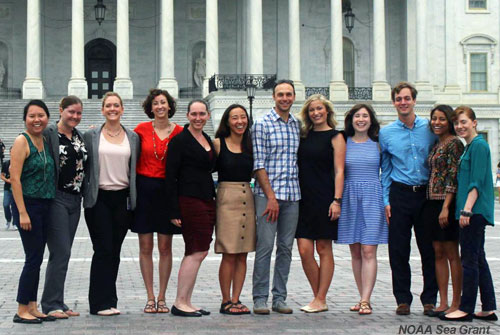
The National Sea Grant John A. Knauss Fellowship provides a unique educational and professional experience to graduate students who have an interest in ocean, coastal and Great Lakes resources and in the national policy decisions affecting those resources. The Fellowship, named after one of Sea Grant's founders and former National Oceanic and Atmospheric Administration (NOAA) Administrator John A. Knauss, matches highly qualified graduate students with hosts in the legislative and executive branch of government located in the Washington, D.C. area, for a one-year paid fellowship.
+
What is the Sea Grant Knauss Fellowship?
The John A. Knauss Marine Policy Fellowship (Sea Grant Knauss Fellowship Program) is offered through the National Sea Grant College Program (Sea Grant), which was enacted by the U.S. Congress in 1966 (amended in 2008, Public Law 110-394) to support federal and state partnerships that harness the intellectual capacity of the nation’s universities and research institutions to solve problems and generate opportunities in coastal communities. The Sea Grant Knauss Fellowship provides a unique educational and professional experience to graduate students who have an interest in ocean, coastal and Great Lakes resources and in the national policy decisions affecting those resources. The Fellowship, named after one of Sea Grant's founders and former NOAA Administrator John A. Knauss, matches highly qualified graduate students with hosts in the legislative and executive branches of government located in the Washington, D.C., area, for a one-year paid fellowship. The fellowship is one year (non-renewable). The dates for the 2025 Fellowship are expected to be February 1, 2025 to January 31, 2026. Applicants are strongly encouraged to reach out to the Sea Grant program in the state/territory in which they are seeking a graduate degree at least one to two months prior to the state application deadline to receive application support and provide notification of intent to apply. The applicant should allow sufficient time to schedule an interview with the eligible Sea Grant program at the program’s request. Applications may now be submitted for the 2025 National Sea Grant College Program John A. Knauss Marine Policy Fellowship (Sea Grant Knauss Fellowship Program). The National Sea Grant College Program anticipates funding not fewer than 35 applicants, of which approximately 17 will be assigned to the legislative branch of congress. |
+
Who is eligible?
The following entities are eligible to submit to this opportunity:
- Any student, regardless of citizenship, is eligible to submit to this opportunity if:
- (1) The student is enrolled toward a degree in a graduate program at any point between the onset of the 2023 Fall Term (quarter, trimester, semester, etc.) and February 15, 2024;
- (2) The graduate degree will be awarded through an accredited institution of higher education in the United States or U.S. Territories, and;
- (3) The student has an interest in ocean, coastal, and Great Lakes resources and in the national policy decisions affecting those resources.
The National Sea Grant College Program champions diversity, equity, and inclusion (DEI) by working to create a marine science workforce that reflects the communities we serve. We are recruiting, retaining, and preparing a diverse workforce, and proactively engaging and serving the diverse populations of coastal communities. Sea Grant is committed to building inclusive research, extension, communication, and education programs that serve people with unique backgrounds, circumstances, needs, perspectives, and ways of thinking. We encourage applicants of all ages, races, ethnicities, national origins, gender identities, sexual orientations, disabilities, cultures, religions, citizenship types, marital statuses, education levels, job classifications, veteran status types, income, and socioeconomic status types to apply for this opportunity.
+
How do you apply?
Application submission is through an application to the Sea Grant program in the state in which the student is earning their degree.
- You are strongly encouraged to contact Minnesota Sea Grant and notify us of your intent to apply.
- You must submit your application to Minnesota Sea Grant (or the Sea Grant program in the state in which you're earning your degree) by 5 p.m. Central Time, February 15, 2024.
- If your state is not served by a Sea Grant program (AZ, AR, CO, ID, IA, KS, KY, MO, MT, NE, NV, NM, ND, OK, SD, TN, UT, WV, WY) you should contact the National Sea Grant Office by email or phone 301-734-1085.
Application Materials:
You can read detailed information about the application materials and evaluation criteria. In short, you will need to include:
- Curriculum vitae (C.V.)
- Personal education and career development response
- Relevant coursework and future year plans (e.g., classes, work, internships, etc.)
- Two letters of recommendation from individuals who have worked with applicant, including at least one from a faculty member with knowledge of the student's academic and research (when applicable) performance.
- Clearly legible digital or scanned copies of all undergraduate and graduate student transcripts.
Apply Submission:
- Go to Minnesota Sea Grant's eSeaGrant fellowship submission portal.
- Register.
- Begin your application. Detailed application instructions are provided in the portal.
- After your application is submitted, MNSG will review your application and may arrange an interview with the MNSG director.
- If you have questions, please contact Minnesota Sea Grant Research and Fellowship Coordinator Alex Frie
+
What happens if you are selected?
- You will be notified if you are a selected finalist in mid to late summer.
- Note that you are a called a selected finalist until you are placed with a host. After placement you are then called a Knauss Fellow.
- After finalists are selected, you will be invited to a webinar to describe the next steps, including explaining the differences between executive and legislative placements. You will then be asked to write a 300 word or less justification for wanting to be placed in the executive or legislative class. The National Sea Grant Office will announce placements in late summer.
- There may be several other informational webinars to help you prepare for your fellowship year.
- In October (executive fellows) or late November/early December (legislative fellows) finalists will participate in placement week. Placement week is filled with interviews, happy hours with potential hosts, and then host position-fellow pairing.
- To learn more about the types of placements available through the fellowship program please review the list of potential 2020 executive and legislative Knauss positions.
- Please note, For most executive branch offices, selected fellows must pass a federal background check to gain security clearance. This includes answering questions about your previous citizenship, residence, education, employment, character references, selective service, military service, and illegal drug use. Please follow this link to an example of the form you will have to fill out.
+
Why Minnesota Sea Grant?
Minnesota Sea Grant is a strong supporter of the National Sea Grant John A. Knauss Marine and Great Lakes Policy Fellowship program because it directly supports Sea Grant's mission to enhance the practical use and conservation of coastal, marine and Great Lakes resources in order to create a sustainable economy and environment. The Knauss program also supports the National and Minnesota Sea Grant workforce development focus area.
+
What do you need to include in your application?
You can read detailed information about the application materials and evaluation criteria. In short, you will need to include:
- Curriculum vitae (C.V.)
- Personal education and career development response
- Relevant coursework and future year plans (e.g., classes, work, internships, etc.)
- Two letters of recommendation from individuals who have worked with applicant, including at least one from a faculty member with knowledge of the student's academic and research (when applicable) performance.
- Clearly legible digital or scanned copies of all undergraduate and graduate student transcripts.
- If applicable, a written statement from the National Sea Grant Office (NGSO) Knauss Fellowship Program Manager referring the applicate to the appropriate state Sea Grant program.
- A signed letter of recommendation from the state Sea Grant director, which follows an interview between the applicant and the Sea Grant director.
+
Current Minnesota Sea Grant Knauss Fellows
| Knauss Fellowship Year | Minnesota Sea Grant Knauss Fellow | Host Agency | Host Office |
|---|---|---|---|
| 2024 | Erik Simula | U.S. Geological Survey | National Ocean Mapping and Charting |
| 2024 | Gurparteet Singh | NOAA Office of the Chief Financial Officer (CFO)/Chief Administrative Officer (CAO) | Budget Execution and Formulation Division |
+
Past Minnesota Sea Grant Knauss Fellows
| Knauss Fellowship Year | Minnesota Sea Grant Knauss Fellow |
|---|---|
| 2023 | Brandon Barlow |
| 2023 | Devin Burri |
| 2023 | Mary Collins |
| 2023 | Jackie Culotta |
| 2023 | Celina Harris |
| 2022 | Naomi Blinick |
| 2020 | Kirsten Rhude |
| 2019 | Dan Takaki |
| 2018 | Jillian Farkas |
| 2012 | Leah Sharpe |
| 2012 | Brooklyn White |
| 2011 | Anne Cooper |
| 2010 | Kelly Pennington |
| 2010 | Jessica Eichmiller |
| 2008 | Julie Palakovich Carr |
| 2003 | Barbara Peichel |
| 2002 | Erik Heinen |
| 2000 | Jonathan Pundsack |
| 1999 | Susan Solarz |
| 1996 | Lynn Mizner Maher |
| 1991 | Colleen Baggot Henson |
| 1991 | Dan Olson |
| 1989 | David Nelson |
| 1988 | Stephen Frerichs |
| 1988 | Leslie Sherman |
2024 Knauss Fellows
Program Staff
Program News

ST. PAUL and DULUTH, Minn.
Featured Stories
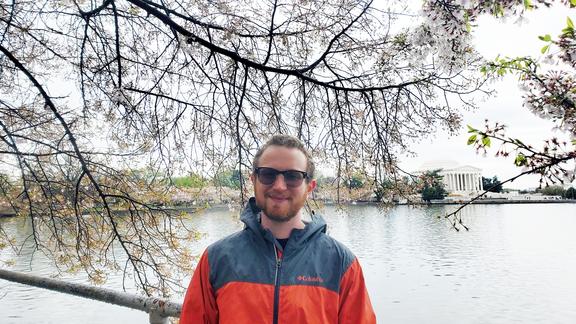
Our May 2023 communications column is by Minnesota Sea Grant (MNSG) Communications Associate Hannah Cullen.
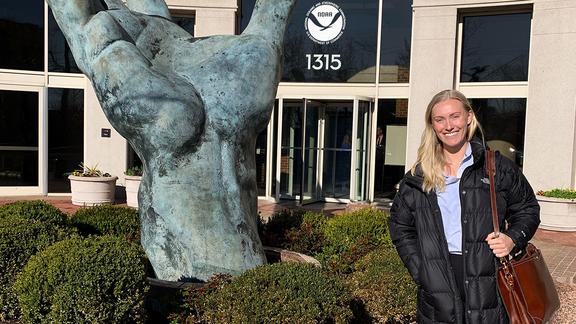
Our April 2023 communications column is by Minnesota Sea Grant (MNSG) Communications Associate Hannah Cullen.
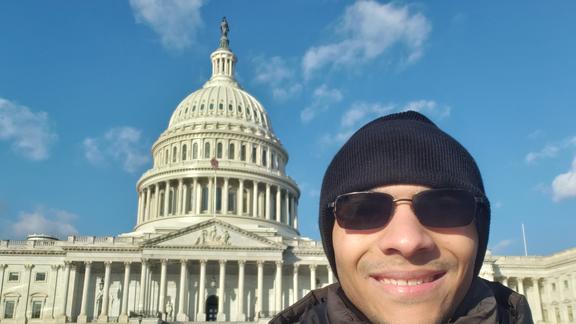
Our March 2023 communications column is by Minnesota Sea Grant (MNSG) Communications Associate Hannah Cullen.
